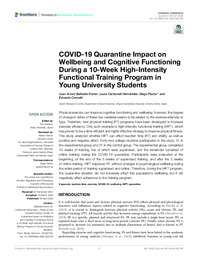Título :
COVID-19 Quarantine Impact on Wellbeing and Cognitive Functioning During a 10-Week High-Intensity Functional Training Program in Young University Students |
Autor :
Ballester-Ferrer, Juan Arturo
Carbonell-Hernández, Laura
Pastor, Diego
Cervelló, Eduardo |
Editor :
Frontiers Media |
Departamento:
Departamentos de la UMH::Ciencias del Deporte |
Fecha de publicación:
2022 |
URI :
https://hdl.handle.net/11000/37968 |
Resumen :
Physical exercise can improve cognitive functioning and wellbeing; however, the degree of change in either of these two variables seems to be related to the exercise intensity or type. Therefore, new physical training (PT) programs have been developed to increase exercise efficiency. One such example is high-intensity functional training (HIFT), which has proven to be a time-efficient and highly effective strategy to improve physical fitness. This study analyzed whether HIFT can affect reaction time (RT) and vitality, as well as positive and negative affect. Forty-two college students participated in the study, 21 in the experimental group and 21 in the control group. The experimental group completed 10 weeks of training, five of which were supervised, and the remainder consisted of online training during the COVID-19 quarantine. Participants were evaluated at the beginning, at the end of the 5 weeks of supervised training, and after the 5 weeks of online training. HIFT improved RT without changes in psychological wellbeing during the entire period of training supervised and online. Therefore, during the HIFT program, the quarantine situation did not adversely affect this population’s wellbeing, but it did negatively affect adherence to the training program.
|
Palabras clave/Materias:
Reaction-time
Exercise
COVID-19
Wellbeing
HIFT
Quarantine |
Área de conocimiento :
CDU: Bellas artes: Diversiones. Espectáculos. Cine. Teatro. Danza. Juegos.Deportes |
Tipo de documento :
info:eu-repo/semantics/article |
Derechos de acceso:
info:eu-repo/semantics/openAccess
Attribution-NonCommercial-NoDerivatives 4.0 Internacional |
DOI :
https://doi.org/10.3389/fnbeh.2022.822199 |
Publicado en:
Frontiers in Behavioral Neuroscience |
Aparece en las colecciones:
Artículos Ciencias del Deporte
|
 La licencia se describe como: Atribución-NonComercial-NoDerivada 4.0 Internacional.
La licencia se describe como: Atribución-NonComercial-NoDerivada 4.0 Internacional.
.png)
